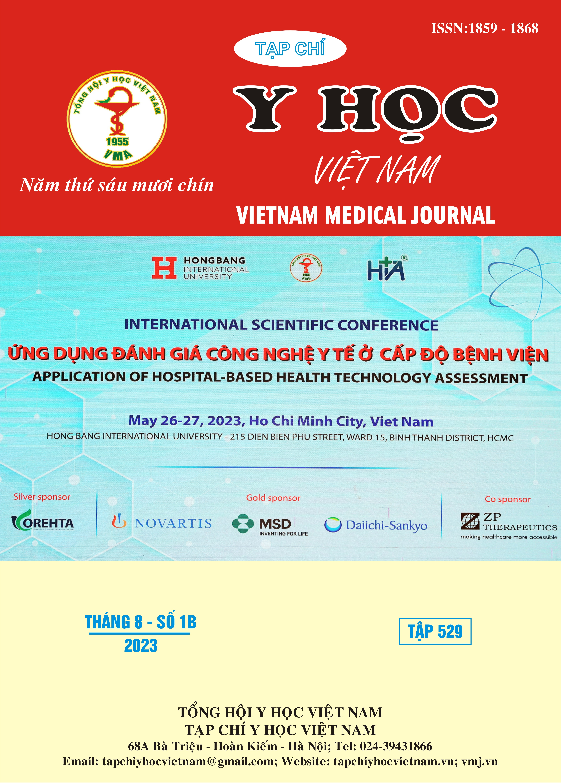EVALUATING CONDITION OF SMALL INTESTINAL BACTERIAL OVERGROWTH IN PATIENTS WITH IRRITABLE BOWEL SYNDROME WITH DIARRHEA BY HYDROGEN BREATH TEST
Main Article Content
Abstract
Introduction: The hydrogen breathing test (HBT) is useful for diagnosing small intestinal bacterial overgrowth (SIBO) and carbohydrate intolerance, especially in patients with irritable bowel syndrome (IBS) because of many similar symptoms. In Vietnam, there is not much data on the relationship between SIBO and IBS. Objectives: This study evaluated condition of SIBO and its relationship to clinical symptoms, quality of life in patients with irritable bowel syndrome with diarrhea (IBS-D) by hydrogen breath test (HBT). Methods: A cross-sectional study was conducted on 30 patients aged ≥ 18 years old, diagnosed with IBS-D according to the ROME IV criteria, and diagnosed with SIBO by HBT at the Institute of Gastroenterology and Hepatology between January 2022 and April 2023. Results: The prevalence of SIBO in IBD-D patients was 70%. The baseline hydrogen concentration and the average hydrogen concentration at 15, 30, 45 minutes concentration in the SIBO group were statistically significant higher in compared to the non-SIBO group (p<0.05). There was no differences in age, gender, BMI, frequency of loose stools, and severity of IBS between the two groups. The SIBO group had more abdominal distension and poorer quality of life compared to the non-SIBO group, the difference was statistically significant (p<0.05). Conclusion: SIBO is quite common among IBS-D patients with the prevalence of 70%. The SIBO group had more abdominal distention and poorer quality of life compared to the non-SIBO group.
Article Details
Keywords
hydrogen breath test (HBT), small intestinal bacterial overgrowth (SIBO), irritable bowel syndrome with diarrhea (IBS-D)
References
2. Chuah KH, Hian WX, Lim SZ, Beh KH, Mahadeva S. Impact of small intestinal bacterial overgrowth on symptoms and quality of life in irritable bowel syndrome. Journal of Digestive Diseases. Published online June 8, 2023. doi:10.1111/1751-2980.13189
3. Francis CY, Morris J, Whorwell PJ. The irritable bowel severity scoring system: a simple method of monitoring irritable bowel syndrome and its progress. Alimentary Pharmacology & Therapeutics. 1997;11(2):395-402. doi:10.1046/j.1365-2036.1997.142318000.x
4. Ghoshal UC, Shukla R, Ghoshal U. Small Intestinal Bacterial Overgrowth and Irritable Bowel Syndrome: A Bridge between Functional Organic Dichotomy. Gut Liver. 2017;11(2):196-208. doi:10.5009/gnl16126
5. Hungin APS, Whorwell PJ, Tack J, Mearin F. The prevalence, patterns and impact of irritable bowel syndrome: an international survey of 40 000 subjects. Alimentary Pharmacology & Therapeutics. 2003;17(5):643-650. doi:https://doi.org/10.1046/j.1365-2036.2003.01456.x
6. Patrick DL, Drossman DA, Frederick IO, Dicesare J, Puder KL. Quality of Life in Persons with Irritable Bowel Syndrome (Development and Validation of a New Measure). Dig Dis Sci. 1998;43(2):400-411. doi:10.1023/A:1018831127942
7. Sachdeva S, Rawat AK, Reddy RS, Puri AS. Small intestinal bacterial overgrowth (SIBO) in irritable bowel syndrome: Frequency and predictors. Journal of Gastroenterology and Hepatology. 2011;26(s3):135-138. doi:10.1111/j.1440-1746.2011.06654.x
8. Schmulson MJ, Drossman DA. What Is New in Rome IV. J Neurogastroenterol Motil. 2017;23(2):151-163. doi:10.5056/jnm16214


